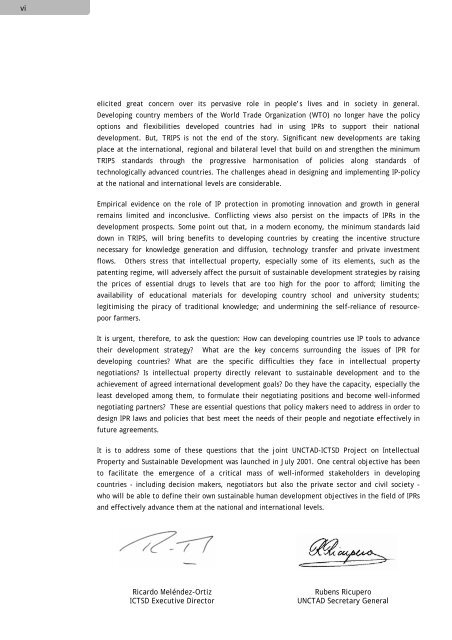Geographical Indications
Geographical Indications
Geographical Indications
You also want an ePaper? Increase the reach of your titles
YUMPU automatically turns print PDFs into web optimized ePapers that Google loves.
vielicited great concern over its pervasive role in people’s lives and in society in general.Developing country members of the World Trade Organization (WTO) no longer have the policyoptions and flexibilities developed countries had in using IPRs to support their nationaldevelopment. But, TRIPS is not the end of the story. Significant new developments are takingplace at the international, regional and bilateral level that build on and strengthen the minimumTRIPS standards through the progressive harmonisation of policies along standards oftechnologically advanced countries. The challenges ahead in designing and implementing IP-policyat the national and international levels are considerable.Empirical evidence on the role of IP protection in promoting innovation and growth in generalremains limited and inconclusive. Conflicting views also persist on the impacts of IPRs in thedevelopment prospects. Some point out that, in a modern economy, the minimum standards laiddown in TRIPS, will bring benefits to developing countries by creating the incentive structurenecessary for knowledge generation and diffusion, technology transfer and private investmentflows. Others stress that intellectual property, especially some of its elements, such as thepatenting regime, will adversely affect the pursuit of sustainable development strategies by raisingthe prices of essential drugs to levels that are too high for the poor to afford; limiting theavailability of educational materials for developing country school and university students;legitimising the piracy of traditional knowledge; and undermining the self-reliance of resourcepoorfarmers.It is urgent, therefore, to ask the question: How can developing countries use IP tools to advancetheir development strategy? What are the key concerns surrounding the issues of IPR fordeveloping countries? What are the specific difficulties they face in intellectual propertynegotiations? Is intellectual property directly relevant to sustainable development and to theachievement of agreed international development goals? Do they have the capacity, especially theleast developed among them, to formulate their negotiating positions and become well-informednegotiating partners? These are essential questions that policy makers need to address in order todesign IPR laws and policies that best meet the needs of their people and negotiate effectively infuture agreements.It is to address some of these questions that the joint UNCTAD-ICTSD Project on IntellectualProperty and Sustainable Development was launched in July 2001. One central objective has beento facilitate the emergence of a critical mass of well-informed stakeholders in developingcountries - including decision makers, negotiators but also the private sector and civil society -who will be able to define their own sustainable human development objectives in the field of IPRsand effectively advance them at the national and international levels.Ricardo Meléndez-OrtizICTSD Executive DirectorRubens RicuperoUNCTAD Secretary General









